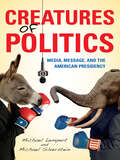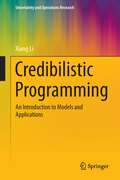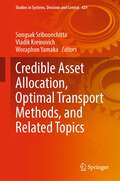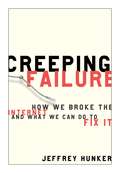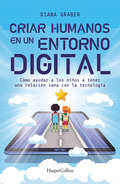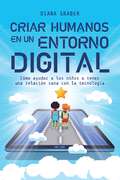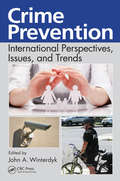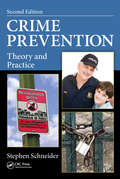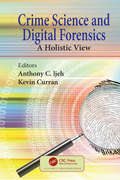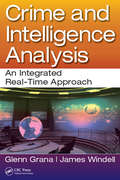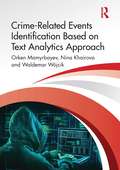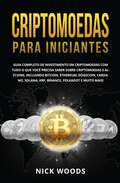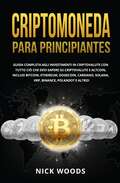- Table View
- List View
Creators of Intelligence: Industry secrets from AI leaders that you can easily apply to advance your data science career
by John K. Thompson Dr. Alex AnticGet your hands on the secret recipe for a rewarding career in data science from 18 AI leadersPurchase of the print or Kindle book includes a free PDF eBookKey FeaturesGain access to insights and expertise from data science leaders shared in one-on-one interviewsGet pragmatic advice on how to become a successful data scientist and data science leaderReceive guidance to overcome common pitfalls and challenges and ensure your projects' successBook DescriptionA Gartner prediction in 2018 led to numerous articles stating that "85% of AI and machine learning projects fail to deliver.” Although it's unclear whether a mass extinction event occurred for AI implementations at the end of 2022, the question remains: how can I ensure that my project delivers value and doesn't become a statistic? The demand for data scientists has only grown since 2015, when they were dubbed the new “rock stars” of business. But how can you become a data science rock star? As a new senior data leader, how can you build and manage a productive team? And what is the path to becoming a chief data officer? Creators of Intelligence is a collection of in-depth, one-on-one interviews where Dr. Alex Antic, a recognized data science leader, explores the answers to these questions and more with some of the world's leading data science leaders and CDOs. Interviews with: Cortnie Abercrombie, Edward Santow, Kshira Saagar, Charles Martin, Petar Velickovic, Kathleen Maley, Kirk Borne, Nikolaj Van Omme, Jason Tamara Widjaja, Jon Whittle, Althea Davis, Igor Halperin, Christina Stathopoulos, Angshuman Ghosh, Maria Milosavljevic, Dr. Meri Rosich, Dat Tran, and Stephane Doyen.What you will learnFind out where to start with AI ethics and how to evolve from frameworks to practiceDiscover tips on building and managing a data science teamReceive advice for organizations seeking to build or mature a data science capabilityStop beating your head against a brick wall – pick the environment that'll support your successRead stories from successful data leaders as they reflect on the successes and failures in data strategy developmentUnderstand how business areas can best work with data science teams to drive business valueWho this book is forThis book is for a wide range of audience, from people working in the data science industry through to data science leaders and chief data officers. This book will also cater to senior business leaders interested in learning how data and analytics are used to support decision-making in different domains and sectors. Students contemplating a career in artificial intelligence (AI) and the broader data sector will also find this book useful, along with anyone developing and delivering university-level education, including undergraduate, postgraduate, and executive programs.
Creatures of Politics: Media, Message, and the American Presidency
by Michael Silverstein Michael LempertThis analysis of campaign messaging and image-making is “a fascinating read and an illuminating look into the complex realm of political rhetoric” (Publishers Weekly).It’s a common complaint that a presidential candidate’s style matters more than substance and that the issues have been eclipsed by mass-media-fueled obsession with a candidate’s every slip, gaffe, and peccadillo. This book explores political communication in American presidential politics, focusing on what insiders call “message.”Message, Michael Lempert and Michael Silverstein argue, is not simply an individual’s positions on the issues but the craft used to fashion the creature the public sees as the candidate. Lempert and Silverstein examine some of the revelatory moments in debates, political ads, interviews, speeches, and talk shows to explain how these political creations come to have a life of their own. From the pandering “Flip-Flopper” to the self-reliant “Maverick,” the authors demonstrate how these figures are fashioned out of the verbal, gestural, sartorial, behavioral—as well as linguistic—matter that comprises political communication.“This book captures better than any other the way ‘messaging’ works . . . their lively account of the culture of presidential communication remains sensitive to both the comedy and the seriousness of its subject.” —Michael Warner, Yale University
Credibilistic Programming: An Introduction to Models and Applications (Uncertainty and Operations Research)
by Xiang LiIt provides fuzzy programming approach to solve real-life decision problems in fuzzy environment. Within the framework of credibility theory, it provides a self-contained, comprehensive and up-to-date presentation of fuzzy programming models, algorithms and applications in portfolio analysis.
Credible Asset Allocation, Optimal Transport Methods, and Related Topics (Studies in Systems, Decision and Control #429)
by Vladik Kreinovich Songsak Sriboonchitta Woraphon YamakaThis book describes state-of-the-art economic ideas and how these ideas can be (and are) used to make economic decision (in particular, to optimally allocate assets) and to gauge the results of different economic decisions (in particular, by using optimal transport methods). Special emphasis is paid to machine learning techniques (including deep learning) and to different aspects of quantum econometrics—when quantum physics and quantum computing models are techniques are applied to study economic phenomena. Applications range from more traditional economic areas to more non-traditional topics such as economic aspects of tourism, cryptocurrencies, telecommunication infrastructure, and pandemic. This book helps student to learn new techniques, practitioners to become better knowledgeable of the state-of-the-art econometric techniques, and researchers to further develop these important research directions
Creeper Family Vacation: The Creeper Diaries, An Unofficial Minecrafter's Novel (Creeper Diaries #5)
by Amanda Brack Greyson MannCan Gerald survive vacation with his crazy family? The Creeper family is planning a month-long summer vacation! But where will they go? On a road trip across the Overworld? Backpacking in the Extreme Hills? Camping out in caves? Gerald and his sisters can't agree! When Dad suggests they do all three, Gerald hops on board. But he quickly realizes that the only thing worse than being stuck with his sisters at home is being stuck with them in a minecart for hours on end. Cammy is so excited, she keeps blowing up. Cate is sulking because she couldn't pack all her wigs. And Chloe is determined to stir up trouble wherever they go—and she’s dragging Gerald right along with her. Abandoned mineshafts? Let's check 'em out! Miners? Let's freak 'em out! Cave spiders? Let's blow them into oblivion! To get through this vacation, Gerald is going to have to get creative—and come up with a serious survival plan.
Creeper Invasion: An Unofficial Minetrapped Adventure, #5 (The Unofficial Minetrapped Adventure #5)
by Winter MorganThe three friends trapped in their Minecraft game have never been closer to escaping the Overworld, and they can’t wait to return home after being trapped on the server for so long.But then a vicious horde of creepers attacks, delaying their escape. Soon the gang learns that there’s a new villain behind the attack: a griefer so twisted that he’d rather stay trapped in the Overworld than live a mundane life in the real world-and he has no qualms about keeping every other player trapped on the server with him. Can the friends and their new allies defeat the creepers, conquer their new enemy, and finally return home?Friends and enemies unite against evil in this exhilarating fifth book in bestselling author Winter Morgan’s Unofficial Minetrapped Adventure series.Sky Pony Press, with our Good Books, Racehorse and Arcade imprints, is proud to publish a broad range of books for young readers-picture books for small children, chapter books, books for middle grade readers, and novels for young adults. Our list includes bestsellers for children who love to play Minecraft; stories told with LEGO bricks; books that teach lessons about tolerance, patience, and the environment, and much more. While not every title we publish becomes a New York Times bestseller or a national bestseller, we are committed to books on subjects that are sometimes overlooked and to authors whose work might not otherwise find a home.
Creeper on the Case: The Creeper Diaries, An Unofficial Minecrafters Novel (Creeper Diaries #6)
by Amanda Brack Greyson MannWhen Gerald's mom says he should get more "involved" at school, he joins the newspaper staff. But reporting on current events is a snooze, until he stumbles onto a few mysteries. Why is Room 117 always locked? What is the disgusting smell coming out of Mr. Zane's briefcase? And . . . why is Gerald's best friend, Sam the Slime, suddenly acting so strangely? Someone has to figure out what's really going on at Mob Middle School. But never fear -- Gerald Creeper Jr., super sleuth, is here!
Creeper's Got Talent: The Creeper Diaries, An Unofficial Minecrafter's Novel (Creeper Diaries #2)
by Amanda Brack Greyson MannGerald made it through the first few weeks of Mob Middle School in one piece (give or take a limb), even if his quest for popularity hasn’t led to fame and glory yet. When he hears about the school’s upcoming talent show, Gerald sets his sights on a new plan: unveiling his hidden talents as a rapper. He can picture it already—kids will finally know his name. They'll beg for his autograph. Maybe he’ll even impress the super-popular Eddy Enderman!But Gerald’s got some rivals for that top spot, not the least of which is a band of spider jockeys determined to keep a sixth-grader from winning the show. His sister is determined to blow him out of the water with her cannonball trick. Even his best friend steps up the competition with his slime-block trampoline. In the second book of this hilarious, heavily illustrated, diary format series for Minecrafters, Gerald may win fame and glory—but what will he lose along the way?
Creepin' Through the Snow: The Creeper Diaries, An Unofficial Minecrafter's Novel, Special Edition (Creeper Diaries)
by Greyson MannA very special Christmas-themed Creeper Diaries adventure featuring the hilarious underdog narrator every Minecrafter can relate to!Gerald Creeper Jr. needs a new plan to survive the holidays. Why? Because he "accidentally" spent the emeralds his parents gave him to buy gifts. Oops! But no worries. He's sure he can make it all back by helping Sam the Slime put on a holiday show for little mobs in the neighborhood. Gerald can picture it already: he'll perform his new song "Rapping through the Snow." Everyone at Mob Middle School will love it!Instead, he's humiliated when Sam wraps him in twinkly lights and dubs him a talking Christmas tree. Gerald is ready to explode, until he meets a baby zombie with a special holiday wish. With a Santa skin, a wolf-drawn sleigh, and a potion of fire-resistance (to help him safely down the chimney), can he make her wish come true?This special Christmas edition of The Creeper Diaries, Creepin’ Through the Snow, is the third book in this laugh-out-loud funny, heavily illustrated, diary-format series for Minecrafters. This adventure series is created especially for readers who love the fight of good vs. evil, magical academies like Hogwarts in the Harry Potter saga, and games like Minecraft, Terraria, and Pokemon GO.
Creeping Failure: How We Broke the Internet and What We Can Do to Fix It
by Jeffrey HunkerThe Internet is often called a superhighway, but it may be more analogous to a city: an immense tangle of streets, highways, and interchanges, lined with homes and businesses, playgrounds and theatres. We may not physically live in this city, but most of us spend a lot of time there, and even pay rents and fees to hold property in it.But the Internet is not a city of the 21st century. Jeffrey Hunker, an internationally known expert in cyber-security and counter-terrorism policy, argues that the Internet of today is, in many ways, equivalent to the burgeoning cities of the early Industrial Revolution: teeming with energy but also with new and previously unimagined dangers, and lacking the technical and political infrastructures to deal with these problems. In a world where change of our own making has led to unexpected consequences, why have we failed, at our own peril, to address these consequences?Drawing on his experience as a top expert in information security, Hunker sets out to answer this critical question in Creeping Failure. Hunker takes a close look at the "creeping failures" that have kept us in a state of cyber insecurity: how and why they happened, and most crucially, how they can be fixed. And he arrives at some stunning conclusions about the dramatic measures that we will need to accomplish this.This groundbreaking book is an essential first step toward understanding the World Wide Web in a larger context as we try to build a safer Internet "city." But it also raises issues that are relevant far outside the online realm: for example, how can we work together to create not just new policy, but new kinds of policy? Creeping Failure calls for nothing less than a basic rethinking of the Internet -- and of how we solve problems together.From the Hardcover edition.
Creo Parametric 9.0 Tutorial
by Roger ToogoodThe eleven lessons in this tutorial introduce you to the design capabilities of Creo Parametric 9.0. The tutorial covers the major concepts and frequently used commands to advance from a novice to an intermediate user level. Major topics include part and assembly creation and the creation of engineering drawings. Also illustrated are the major functions that make Creo Parametric a parametric solid modeler. Although the commands are presented in a click-by-click manner, an effort has been made, in addition to showing/illustrating the command usage, to explain why certain commands are being used and the relation of feature selection and construction to the overall part design philosophy. Simply knowing where commands can be found is only half the battle. As is pointed out numerous times in the text, creating useful and effective models of parts and assemblies requires advance planning and forethought. Moreover, since error recovery is an important skill, considerable time is spent exploring the created models. In fact, some errors are intentionally induced so that users will become comfortable with the "debugging" phase of model creation. At the end of each lesson is a short quiz reviewing the new topics covered in that chapter. Following the quiz are several simple "exercise" parts that can be created using new commands taught in that lesson. In addition to these, an ongoing project is also included throughout the book. This project consists of several parts that are introduced with the early lessons and finally assembled at the end. Who this book is for This book has been written specifically with students in mind. Typically, students enter their first CAD course with a broad range of abilities, both in spatial visualization and computer skills. The approach taken here is meant to allow accessibility to persons of all levels. These lessons, therefore, were written for new users with no previous experience with CAD, although some familiarity with computers is assumed.
Criar humanos en un entorno digital: Cómo ayudar a los niños a tener una relación sana con la tecnología
by Diana GraberSexting, cyberbullying, la venganza del porno, depredadores en línea... todas estas amenazas potenciales pueden tentar a los padres a arrebatar de las manos de sus hijos, el teléfono inteligente o la tableta. Si bien la privación puede eliminar los peligros, ese enfoque también significa que su hijo se pierde los muchos beneficios y oportunidades de la tecnología.Criando humanos en un mundo digital muestra cómo los niños digitales deben aprender a navegar por este entorno, desde el equilibrio de la vida real y virtual hasta convertirse en modelos positivos y líderes.Este libro está lleno de temas de discusión en el hogar y actividades divertidas que cualquier familia ocupada puede realizar en su rutina diaria. Con una serie de consejos prácticos basados en la investigación académica y la experiencia práctica, los padres de hoy finalmente tienen lo que han estado esperando: una guía para criar niños digitales que se convertirán en los líderes positivos y exitosos que nuestro mundo necesita desesperadamente.
Criar humanos en un entorno digital: Cómo ayudar a los niños a tener una relación sana con la tecnología
by Diana GraberSexting, cyberbullying, la venganza del porno, depredadores en línea... todas estas amenazas potenciales pueden tentar a los padres a arrebatar de las manos de sus hijos, el teléfono inteligente o la tableta. Si bien la privación puede eliminar los peligros, ese enfoque también significa que su hijo se pierde los muchos beneficios y oportunidades de la tecnología.Criando humanos en un mundo digital muestra cómo los niños digitales deben aprender a navegar por este entorno, desde el equilibrio de la vida real y virtual hasta convertirse en modelos positivos y líderes.Este libro está lleno de temas de discusión en el hogar y actividades divertidas que cualquier familia ocupada puede realizar en su rutina diaria. Con una serie de consejos prácticos basados en la investigación académica y la experiencia práctica, los padres de hoy finalmente tienen lo que han estado esperando: una guía para criar niños digitales que se convertirán en los líderes positivos y exitosos que nuestro mundo necesita desesperadamente.Raising Humans in a Digital WorldSexting, cyberbullying, revenge porn, online predators… all of these potential threats can tempt parents to snatch the smartphone or tablet right out of their children&’s hands. While avoidance might eliminate the dangers, that approach also means your child misses out on technology&’s many benefits and opportunities.Raising Humans in a Digital World shows how digital kids must learn to navigate this environment, throughdeveloping social-emotional skillsbalancing virtual and real lifebuilding safe and healthy relationshipsavoiding cyberbullies and online predatorsprotecting personal informationidentifying and avoiding fake news and questionable contentbecoming positive role models and leaders.This book is packed with at-home discussion topics and enjoyable activities that any busy family can slip into their daily routine. Full of practical tips grounded in academic research and hands-on experience, today&’s parents finally have what they&’ve been waiting for—a guide to raising digital kids who will become the positive and successful leaders our world desperately needs.
Crie o seu blog e torne-o um Sucesso
by Rafa Osuna Rosane BujesVocê está pensando em começar a escrever em um blog ou já tem um, mas não tem certeza de que fazer com ele? Então, este livro é para você mesmo. O que você encontrará neste livro? Ou melhor, o que você acha se começo falando sobre o que não encontrará? Neste livro, você não encontrará filosofia barata sobre blogs. Do tipo que tentam vender algumas pessoas que nunca tiveram sucesso com um blog. Também não encontrará um curso sobre como fazer um blog funcionar em termos técnicos. Hoje em dia, as plataformas de criação de blogs são muito intuitivas e fáceis de usar, de forma que não vale a pena perder tempo lendo um livro para isso. Mas se por um acaso é isso que você está procurando recomendo-lhe um dos diversos tutoriais sobre o assunto que existem, por exemplo, no Youtube. Tampouco irá encontrar neste livro fórmulas mágicas para tornar-se milionário com seu blog em duas semanas. Acredite em mim, se alguém lhe oferecer algo assim, fuja imediatamente dele. O que você encontrará neste livro é um pequeno resumo daquilo que escrevi no meu blog pessoal (EL ÚLTIMO BLOG - O ÚLTIMO BLOG) no período dos últimos 10 anos. Tempo em que não somente mantive meu blog, como também dirigi uma rede de blogs com mais de 50 redatores, participei em blogs colaborativos, dei conferências e cursos sobre blogs, participei em vários livros ... O que desejei oferecer-lhe neste livro, como resumo destes 10 anos de blogging, trata-se de uma seleção de artigos na qual acredito refletir, de maneira clara e concisa, tudo o que você necessita para triunfar com seu blog. São 15 artigos que selecionei dos mais de 2000 que publiquei nestes anos. Artigos que fiz alguns ajustes para a publicação neste livro, de maneira que, mantendo o frescor de um post, tivesse ligação entre eles. Assim, espero ter conseguido que com algumas leituras rápidas, próprias dos artigos de um blog, voc
Crie sua Agência de Marketing Digital
by Robinson Hardin Gerson AguilarComo crio minha agência de marketing on-line? Por onde começo? Quanto dinheiro devo ter? É o que todo empreendedor desta era digital se pediu para formar uma agência de marketing. Com as tecnologias atuais e acesso à Internet, muitas portas se abrem para nós. Um mundo cheio de possibilidades. Este livro irá ajudá-lo a conhecer um pouco mais através destas 14 dicas precisas para realizar com sua Agência de Marketing Online. Cresça, cresça sua marca, relacione-se com seus clientes, estude sua concorrência, isso e muito mais para que você possa começar a iniciar seu negócio de Marketing Digital.
Crime Prevention: International Perspectives, Issues, and Trends
by John A. WinterdykThis text presents an international approach to the study of crime prevention. It offers an expansive overview of crime prevention initiatives and how they are applied across a wide range of themes and infractions, from conventional to non-conventional forms of crime. Based on a review of the literature, this is the first text to offer a broad, yet comprehensive, examination of how and why crime prevention has gained considerable traction as an alternative to conventional criminal justice practices of crime control in developed countries, and to provide a cross-sectional view of how crime prevention has been applied and how effective such initiatives have been. Crime Prevention: International Perspectives, Issues, and Trends is suitable for undergraduate students in criminology and criminal justice programs, as well as for graduates and undergraduates in special topics courses.
Crime Prevention: Theory and Practice, Second Edition
by Stephen SchneiderIn Crime Prevention: Theory and Practice, Second Edition, Dr. Schneider has updated every chapter in this reliable text using the latest research, the most recently published articles and books, and feedback from professors and students using the first edition. Providing an introduction to dominant approaches, key concepts, theories, and research,
Crime Science and Digital Forensics: A Holistic View
by Anthony C. IjehThis volume is a collation of articles on counter forensics practices and digital investigative methods from the perspective of crime science. The book also shares alternative dialogue on information security techniques used to protect data from unauthorised access and manipulation. Scandals such as those at OPCW and Gatwick Airport have reinforced the importance of crime science and the need to take proactive measures rather than a wait and see approach currently used by many organisations. This book proposes a new approach in dealing with cybercrime and unsociable behavior involving remote technologies using a combination of evidence-based disciplines in order to enhance cybersecurity and authorised controls. It starts by providing a rationale for combining selected disciplines to enhance cybersecurity by discussing relevant theories and highlighting the features that strengthen privacy when mixed. The essence of a holistic model is brought about by the challenge facing digital forensic professionals within environments where tested investigative practices are unable to provide satisfactory evidence and security. This book will be of interest to students, digital forensic and cyber security practitioners and policy makers. It marks a new route in the study of combined disciplines to tackle cybercrime using digital investigations and crime science.
Crime and Intelligence Analysis: An Integrated Real-Time Approach
by James Windell Glenn GranaCrime and Intelligence Analysis: An Integrated Real-Time Approach covers everything crime analysts and tactical analysts need to know to be successful. Providing an overview of the criminal justice system as well as the more fundamental areas of crime analysis, the book will enable students and law enforcement personnel to better understand criminal behavior, learn the basics of conducting temporal analysis of crime patterns, use spatial analysis to better understand crime, apply research methods to crime analysis, and more successfully evaluate data and information to help predict criminal offending and solve criminal cases. Criminal justice and police academy students will learn how to be skilled and credible crime analysts who play a critical role in the daily operations of law enforcement.
Crime-Related Events Identification Based on Text Analytics Approach
by Waldemar Wójcik Orken Mamyrbayev Nina KhairovaAs modern society is extremely dependent on the Internet, social networks, and developing technologies, a threat to the security of both the individual and society as a whole has emerged. The openness and global nature of the Internet create opportunities both for criminals, who can use the available information for criminal purposes, and for law enforcement officials. Police officers, in turn, can deal with the preventive processing of data from the Internet in order to prevent crimes. This type of data analysis can detect illegal or criminal actions even at the stage of their formation. Crime-Related Events Identification Based on Text Analytics Approach describes the possibilities of extracting crime-related facts from semi-structured information from various Internet sources so that crime can be combatted. This book is aimed at police officers and IT professionals working in online investigations.
Crimes and Cover-ups in American Politics: 1776-1963
by Donald JeffriesThe history that the textbooks left out. For far too long, American history has been left in the unreliable hands of those that author Donald Jeffries refers to as the court historians. Crimes and Cover-ups in American Politics: 1776-1963 fights back by scrutinizing the accepted history of everything from the American War of Independence to the establishment reputation of Thomas Jefferson and the other Founding Fathers, the Civil War, the Lincoln assassination, both World Wars, US government experimentation on prisoners, mental patients, innocent children and whole populated areas, the Lindbergh baby kidnapping and much, much more. Secular saints like Abraham Lincoln, Theodore Roosevelt, and Franklin D. Roosevelt are examined in a critical way they seldom have been. Jeffries spares no one and nothing in this explosive new book. The atrocities of Union troops during the Civil War, and Allied troops during World War II, are documented in great detail. The Nuremberg Trials are presented as the antithesis of justice. In the follow-up to his previous, bestselling book Hidden History: An Expose of Modern Crimes, Conspiracies, and Cover-Ups in American Politics, Jeffries demonstrates that crimes, corruption, and conspiracies didn't start with the assassination of President John F. Kennedy. History should be much more than cardboard villains and impossibly unrealistic heroes. Thanks to the efforts of the court historians, most Americans are historically illiterate. Crimes and Cover-ups in American Politics: 1776-1963 is a bold attempt at setting the record straight.
Criminal Enterprise Investigation
by Thomas A. TrierMany cities, towns, and municipalities across the United States have criminal organizations operating within their jurisdictions. This book gives the investigator a guide to probing, evaluating, and analyzing local criminal organizations, with the goal of disrupting and dismantling criminal operations. Subjects covered include investigative field techniques, identification of enterprise vulnerabilities, and an in-depth look into FBI task forces. Intended for law enforcement and other criminal justice professionals, Criminal Enterprise Investigation provides readers with a critical "how to" guide to overcoming criminal enterprise in their communities. Features: Provides step-by-step guide to dismantling criminal organizations Includes real-life examples of successful investigations Covers a wide range of criminal groups, including domestic terrorists, drug cartels, gangs, white-collar criminals, and robbery and extortion rings For those working to combat criminal organizations, this book is an essential guide to best practices. Criminal Enterprise Investigation provides the theory, techniques, and real-world examples necessary to overcome criminal activity for those of any level of expertise, from seasoned criminal justice professionals to those just beginning their careers.
Criminal Investigation for the Professional Investigator (Professional Investigators Series)
by BCPI, CLI, SonneAimed at the busy professional who aspires to become certified in the field, Criminal Investigation for the Professional Investigator details essential techniques a trained investigator will be called upon to perform during the course of a career. The book is authored by a veteran of the NYPD who went on to launch and operate two successful private investigation agencies. It covers crime scenes, death investigations, the art of interrogation, and specific criminal investigations. It also provides important strategies for making arrests and testifying in courtrooms, details the most effective investigative tools to use, and explains the role of criminal defense investigators.
Criptomoedas para Iniciantes: Guia Completo De Investimento Em Criptomoedas Com Tudo O Que Você Precisa Saber Sobre Criptomoedas
by Nick WoodsGuia Completo de Investimento em Criptomoedas com Tudo o que Precisa de Saber sobre Ciptomoedas e Altcoin. Tudo o que Precisa de Saber sobre Altcoins, incluindo Bitcoin, Ethereum, Dogecoin, Cardano, Solana, XRP, Binance, Polkadot e muito mais! Neste livro, abordaremos vários tópicos que permitirão que você construa um conhecimento perspicaz sobre o mundo das criptomoedas. Criptomoeda não é um termo singular, abrange várias moedas digitais que podem ser usadas para comprar bens e serviços ou trocadas. Quase um terço dos investidores em criptomoedas têm entre 25 a 34 anos, tornando-se um investimento popular entre os mais jovens. No entanto, qualquer pessoa de qualquer idade ou formação pode garantir um bom retorno ao investir nestas moedas. As criptomoedas não existem no sentido físico e são totalmente digitizadas. Isto significa que os registos das moedas são mantidos e registados em bancos de dados virtuais altamente seguros. Consequentemente, estes são menos propensos a falsificação criminal. Com um aumento constante e contínuo na popularidade das criptomoedas, negociá-las é uma ótima forma de obter um bom retorno de qualquer investimento financeiro. Contudo, terá de garantir que faz da maneira correta. Abordaremos o que significa criptomoeda e os vários tipos de criptomoedas. Além dos conhecimentos sobre criptomoedas, também irá aprender sobre a tecnologia blockchain e como esta funciona. Acima de tudo, uma informação importante a ser lembrada é que é bom começar pequeno em vez de se lançar no mercado. Aumento os seus investimentos gradualmente à medida que aprende a negociar nos mercados. Com tempo e prática, tornar-se-á num investidor experiente e confiante em criptomoedas. O investimento em criptomoedas é um trabalho paralelo para muitas pessoas, mas pode tornar-se no foco principal das suas estratégias financeiras. Com o mercado de criptomoedas a atingirem máximas gerais de do
Criptomoneda para Principiantes: Guía Completa de Inversión en Criptomonedas.
by Nick Woods¿Está buscando aprender cómo puede sacar provecho de la revolución de las criptomonedas? ¿Has escuchado sobre Bitcoin, Ethereum y Dogecoin últimamente en las noticias y parece que no puedes entender qué son las criptomonedas? ¿Se pregunta cómo puede comenzar a invertir en criptomonedas, pero realmente no sabe qué es y tiene dudas sobre invertir en algo que no comprende? ¿Desearía poder comprender la criptomoneda, pero tiene miedo de que sea demasiado compleja y complicada? Si esto te suena, ¡sigue leyendo! Las criptomonedas son fascinantes monedas descentralizadas de la nueva era que solo están disponibles en línea y permiten al usuario ser algo anónimo. Con miles de criptomonedas disponibles, existen importantes potenciales de crecimiento. ¡La gran cantidad de proyectos construidos sobre estas cadenas de bloques es prueba suficiente de que la criptomoneda se dirige a la luna!

